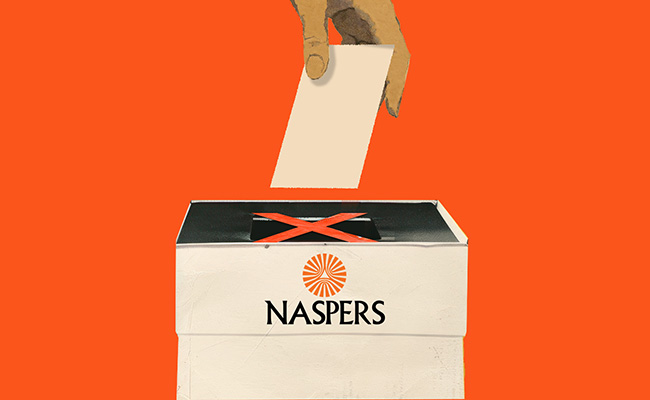You have to hand it to the Naspers “N” shareholders. They don’t give up on their democratic right to vote just because exercising that right is totally pointless thanks to the existence of powerful “A” shares.
A remarkable 75% of them pitched up to the latest AGM. And they voted in an impressively strategic manner, indicating they weren’t there just to protest but to demonstrate concerns about some specific issues. So, while most of their votes were in favour of the resolutions, they were vehemently opposed to several.
If the N shareholders had their way, Steve Pacak would not have been re-appointed to the audit committee; the group’s remuneration policy would likely be scrapped; and, unissued shares would not be placed under the control of the directors.
Long-serving Pacak, who was Naspers’s CFO from 1998 to 2014, received a disconcerting 65.3% vote against his re-appointment to the audit committee. This was even worse than the 2024 AGM, when 54% of ordinary N shareholders objected to his re-appointment to that committee.
This year shareholders also got to vote on his re-election to the main board. An unsettling 44.7% of N shareholders thought it wasn’t a good idea and voted against it.
And then, the remuneration votes. A near record-breaking 74% of N shareholders voted against the group’s remuneration policy, which this year is packed to the gills with unjustifiably generous “moon shot” payment plans for a slew of lucky executives. And 71% voted against the remuneration implementation report.
This vote is only an advisory one, which means it has no consequences and is merely intended to “advise” the board of the level of shareholder content or, in many cases such as this, discontent.
In most companies this unprecedented level of opposition would likely prompt serious introspection and changes to the policy. Not so at Naspers, where the board probably thought they were onto a winner given the 85% and 84% opposition to the policy and implementation report (respectively) notched up at last year’s AGM.
This consistent refusal to take N shareholders’ views into consideration was no doubt behind last year’s 76% vote against the re-election of remuneration committee chair Craig Enenstein to the board.
But heck, this isn’t a popularity contest, it’s not even a show of corporate democracy. Enenstein and Pacak will remain on board until the powerful A shareholders decide otherwise.
The all-powerful A shares
Those were the issues the N shareholders felt very deeply about. But there were others that they felt concerned enough about to vote against in significant numbers.
A total 39% of them would like to see Debra Meyer off the board; a surprising 17.6% voted against chair Koos Bekker’s re-appointment to the board; 36.3% voted against Rachel Jafta’s re-election to the social, ethics and sustainability committee; and 47% voted against approving the general issue of shares for cash.
Jafta has been on the board since 2003 and Meyer since 2009, so you can see why the N shareholders might think it’s time for them to move on. But evidently the controlling A shareholders think nothing of the sort; far from it. Despite their exceptionally long tenure these two directors continue to be described as independent non-executive directors. It does rather add to the sense of an oil-gushing tin-pot dictatorship.
However, all of this shareholder indignation amounts to precisely zilch because of the A shares, which are unlisted and have 1,000 votes per share. The A shares are controlled by Keeromstraat 30 Beleggings Limited and Nasbel, which in turn are primarily directed by entities controlled by Bekker, Cobus Stofberg – who recently retired from the Naspers and Prosus boards – and Sanlam.
At the latest AGM the 813.6-million A votes comprehensively overwhelmed the 122.4-million N votes. That is what the A votes were designed to do. It is why, since Naspers was listed in 1995, every single resolution presented to shareholders has been overwhelmingly passed.
Finally, one of the little remarked-upon resolutions at this year’s AGM was the very last one put to the shareholders. It was a special resolution seeking approval for a share subdivision. The proposal, which was enthusiastically supported by the N shareholders (only 1.5% of them voted against the resolution) and A shareholders, will see the shares being divided on a five-for-one basis. This means 636-million new N shares will be issued and allotted and 3.8-million A shares.
It’s a good idea, given that Naspers is trading at a smidgen under R6,000, which, as the board says, is several times above the average share price of the constituents of the JSE top 40 index. The board says it wants to make the shares more accessible to a broader base of investors.
The five-for-one split is also expected to bring the Naspers N share price more in line with the Prosus N share.
Top image: Rawpixel/Currency collage.
Sign up to Currency’s weekly newsletters to receive your own bulletin of weekday news and weekend treats. Register here.













Shares owing to me and my 6 siblings have still not been paid to us. They were NASPERS shares bought by my late father.